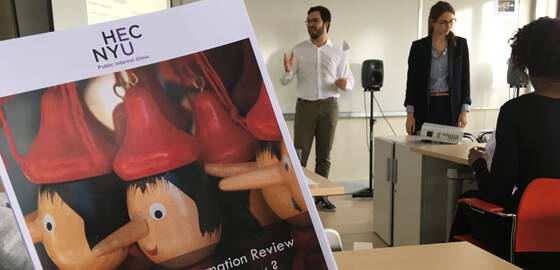EU Anti Fake News Initiative violates fundamental rights, says Prof. Alberto Alemanno
Following on the EU Commission announcement that it will adopt a Communication on tackling disinformation online, Alberto Alemanno filed today a complaint to the European Ombudsman alleging that the current EU approach to counter fake news - as epitomised by the EU Disinformation Review - violates the rights to freedom of expression and due process of those accused of distributing disinformation. Despite being a well-intentioned initiative to respond to the challenges posed by pro-Kremlin disinformation, the EU should ensure the respect of fundamental rights while engaging in fact-checking.

The Disinformation Review is a publication of the European External Action Service (the European Union’s diplomatic service) to target fake news and online disinformation. Following our request for access to documents, EEAS conceded that the EU Disinformation Review uses an “ad hoc” methodology for conducting its fact-checks, which makes it an outlier in the international fact-checking community led by the International Fact-Checking Network (IFCN).
The EU has failed to comply with fundamental rights
The EU Disinformation Review process fails to provide EU citizens with a right to be heard, objective impartiality, and motivations for their decisions, which are required for the government to respect the Freedom of Expression of citizens under Article 11 of the EU Charter of Fundamental Rights. In fact, our complaint comes just over a month after the European Union was sued in Dutch court for allegedly having violated the rights of Dutch journalists targeted by the Disinformation Review (the suit has since been settled).
The Review seeks to control content by labelling publishers as “disinforming outlets” and their content as “disinformation,” creating a chilling effect on the work of journalists that is central to democracy. It is true that our media is in a period of crisis, which has opened the door to disinformation campaigns from hostile governments. It may even be true that this crisis requires strong action from Member States and the Commission to protect democratic elections.
However, when anti-fake news actions violate fundamental rights, they themselves undermine our democracy. Liberal democracy requires a free press and the free exchange of ideas, including ideas we find distasteful, disgraceful or outright false. The European Union’s Disinformation Review is failing its citizens, threatening journalists’ and citizens’ Freedom of Speech and Right to Good Administration.
Alberto Alemanno, Jean Monnet Professor of European Union Law and scientific director of the EU Public Interest Law Clinic, stated
“freedom of expression is part of the bedrock of European democracy. The EU must ensure that any actions it takes to counter not only Russian fake news but all forms of disinformation online conforms with the fundamental rights of European citizens. The European Ombudsman - an independent and impartial body - should open an investigation and hold the Commission to account for withholding critical information from the broader public.”
About the Clinic
The EU Clinic is the result of a partnership between New York University School of Law and HEC Paris (Ecole des Hautes Etudes Commerciales de Paris). The clinic was founder and is directed Professor Alberto Alemanno and managed by Paige Morrow. Selected students from both universities work together with leading NGOs, academics and practitioners. The clinic supports organizations that advocate for underrepresented interests before EU institutions on a wide range of matters, including transparency of EU institutions, human rights, consumer rights, and environmental law. More information at http://euclinic.eu.
Contacts
Alberto Alemanno +34 616 77 44 56 alemanno@hec.fr
Paige Morrow +32 483 60 66 72 paige.morrow@nyu.edu